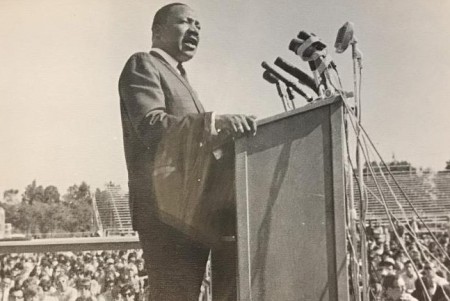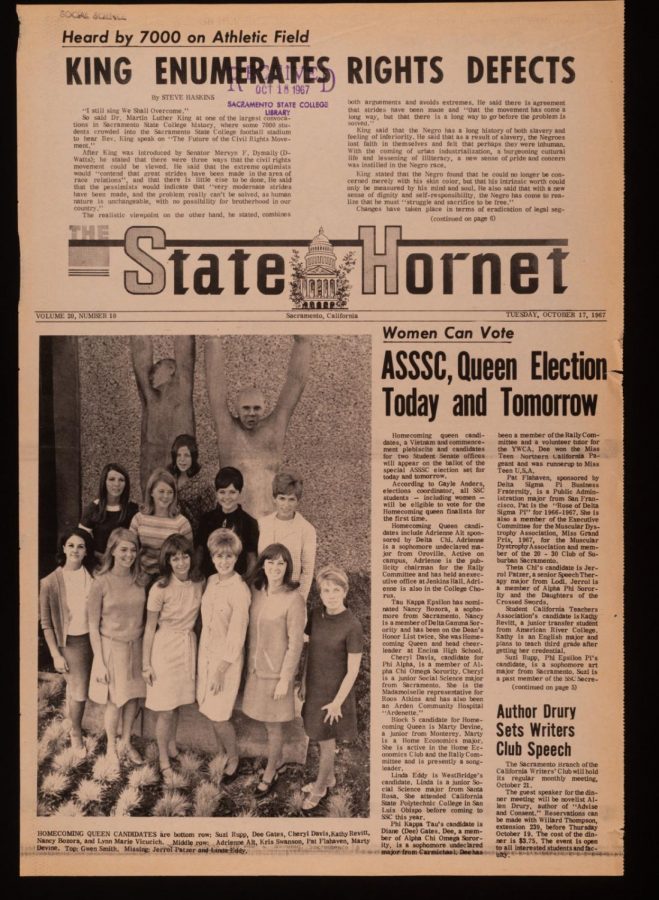From the archives: King enumerates right defects
The State Hornet’s coverage of King’s 1967 visit to Sac State is now online

File Photo -The State Hornet
Civil rights leader Martin Luther King Jr. delivered a speech about racial inequality in front of approximately 7,000 students at Sacramento State College, now named Sacramento State, on Oct. 16, 1967. Sac State was chosen because Dr. King spoke there on a college speaking tour six months before he was killed.
January 21, 2019
The following is a transcription of an article by Steve Haskins on civil rights leader Martin Luther King Jr.’s visit to Sac State originally published in The State Hornet’s Oct. 17, 1967 issue. A gallery of the story as it was printed can be found below.
“I still sing We Shall Overcome.”
So said Dr. Martin Luther King at one of the largest convocations in Sacramento State College history, where some 7000 students crowded into the Sacramento State College football stadium to hear Rev. King speak on “The Future of the Civil Rights Movement.”
After King was introduced by Senator Mervyn F. Dymally (D-Watts); he stated that there were three ways that the civil rights movement could be viewed. He said that the extreme optimists would “contend that great strides have been made in the area of race relations”, and that there is little else to be done. He said that the pessimist would indicate that “very moderate strides have been made, and the problem really can’t be solved, as human nature is unchangeable, with no possibility for brotherhood in our country.”
The realistic viewpoint on the other hand, he stated, combines both arguements and avoids extremes. He said there is agreement that stride have been made and “that the movement has come a long way, but that there is a long way to go before the problem is solved.”
King said that the Negro has a long history of both slavery and feeling of inferiority. He said that as a result of slavery, the Negroes lost faith in themselves and felt that he could no longer be concerned merely with his skin color, but that his worth could only be measured by his mind and soul. He also said that with a new sense of dignity and self-responsibility, the Negro has come to realize that he must “struggle and sacrifice to be free.”
Changes have taken place in terms of eradication of legal segregation; according to King, “but we have a great deal to do.”
“It is certainly a fact that strides have been made,” said King, but that it would be an illusion if America were convinced that no further steps need be taken.
“It is a tragic and daily reminder that we have a long way to go,” King declared. He added that there is another form of violence just as tragic in the American ghetto, he said that it is a form of spiritual and psychological violence.
He said that 50 per cent of the American Negroes still live in deteriorating housing and “have wall-to-wall rats and roaches instead of wall-to-wall carpeting.”
He said that Negro children are still attending segregated schools, if in fact not de jure, then de facto. Schools are far from adequate and often in urban areas less money is spent per pupil in the de facto school districts, than in predominately whites areas, He stated that the pupils upon graduation from these “segregated” schools often read on a sixth to eighth grade level.
He said that the schools are overcrowded and devoid of quality, and that the most serious problem is that of economics. He said that the Negro lives with a major depression, and that this was true of every major city. Another major problem King pointed out, is not only unemployment but underemployment. He said that the Negro can’t function in the mainstream of American life, but rather is adrift in a vast ocean of American prosperity. According to King, people explode in anger with misguided dimensions. He said that he “still believes in non-violence as I did in Montgomery.”
He expressed the feeling that militant non-violence is still the Negro’s most potent weapon. He said that he can’t condemn the riots, but rather condemned that intolerant conditions that society forces on the Negro.
The Negro feels he has no other alternative but to engage in riots to call attention to how America has failed to react to his plight!
King indicated that one of the major causes of Negro frustration has been unfulfilled promises, and that the American people are more concerned with preserving tranquility and that status quo.
He said that the policy makers in the white society have caused many of the problems that create the so-called “long hot summers.”
Congress doesn’t use long cold winters creatively enough according to King, to eradicate the problems that cause the riots of the “long hot summers.”
“Riots are caused by delay and the postponement of justice.
“The American people have got to see that a new era of struggle has come to replace the old–the struggle for total equality.” King said that the new struggle, unlike the old, is going to cost something.
He said that legislation was needed to make civil rights a reality. He said that there must be a massive program, “a bill of rights or Marshall plan for the disadvantaged,” and that Congress must be compelled to enact that legislation.
King then stated that he had a moral responsibility to take a stand against the war in Vietnam, even though that would alienate support from some quarters. He said that the war in Vietnam was doing more to damage the image of our nation than anything in the world today.
“Injustice anywhere is the threat of justice everywhere.” He said that he had to take a stand because his “conscience tells me that it is right.
“Black and white America must learn that their destinies are tied together. There can be no separate path to power and fulfillment.”
“Our goal is freedom,” he said.
He was then given a standing ovation.





























































































































